Tunisia profile - Timeline
- Published
A chronology of key events:
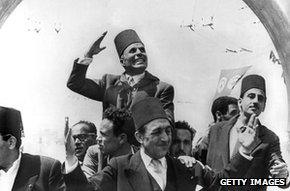
Habib Bourguiba, independent Tunisia's first leader
circa 1100 BC - Phoenicians settle the north African coast. The city of Carthage, near the site of present-day Tunis, becomes a naval power.
146 BC - Carthage falls to the Romans.
439 AD - Vandals invade; Roman buildings and artefacts are destroyed.
600s - Arabs conquer the territory of present-day Tunisia.
909 - Berbers wrest the region from the Arabs.
Ottoman Empire
1600s - Tunisia becomes part of the Turkish Ottoman empire, but has a high degree of autonomy.
1800s - French and Turkish designs on Tunisia force it to tread a careful path.
1881 - French troops occupy Tunis. France controls economic and foreign affairs; Tunisia is a French protectorate from 1883.
1934 - Habib Bourguiba founds the pro-independence Neo-Dustour Party
1942 - World War II: German troops arrive to resist allied forces in Algeria. Allied forces drive German, Italian troops out in 1943.
Independence
1956 20 March - Tunisia becomes independent with Bourguiba as prime minister.
1957 - The monarchy is abolished and Tunisia becomes a republic.
1961 - Tunisia says French forces must leave their base in Bizerte. Fighting breaks out. France pulls out of Bizerte in 1963, after long-running talks.
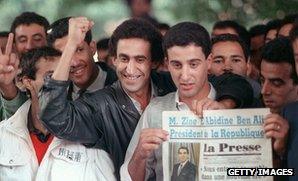
President Bourguiba was deposed by Prime Minister Ben Ali in 1987
1981 - First multi-party parliamentary elections since independence. President Bourguiba's party wins by a landslide.
1985 - Israel raids Palestinian Liberation Organisation (PLO) HQ in Tunis; 60 people are killed. The raid is in response to the killing by the PLO of three Israeli tourists in Cyprus.
1987 - Bloodless palace coup: Prime Minister Zine El Abidine Ben Ali has President Bourguiba declared mentally unfit to rule and takes power himself.
1989 - Ben Ali wins presidential elections. He goes on to be re-elected four more times, the last time in 2009.
1999 - First multi-party presidential elections; Ben Ali wins a third term.
Synagogue bombed
2002 April - 19 people - 11 of them German tourists - are killed in a bomb explosion at a synagogue in the resort of Djerba; Al-Qaeda claims responsibility.
2002 May - President Ben Ali wins a referendum on constitutional changes, paving the way for his fourth term.
2002 September - Jailed leader of Communist Workers' Party, Hamma Hammami, is freed on health grounds. He had been accused of being in an illegal organisation and of inciting rebellion.
2004 October - President Ben Ali wins a fourth term with 94% of the vote.
2005 July - Parliament introduces an upper house - the Chamber of Councillors - which is dominated by the ruling party.
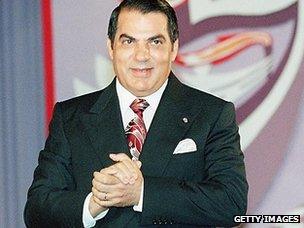
Zine al-Abidine Ben Ali ruled for more than 20 years
2005 November - Tunisia hosts a UN conference on the global information society. Authorities deny that police have harassed journalists and other delegates.
2006 - October - Authorities launch a campaign against the Islamic headscarves worn by some women.
Tunisia moves to close its embassy in Qatar in protest at alleged bias by the Qatar-based al-Jazeera TV channel. The channel broadcast remarks by veteran Tunisian dissident Moncef Marzouki in which he called for peaceful resistance to the Tunisian government.
2006 December - The Progressive Democratic Party (PDP), the main opposition party, elects a woman as leader - a first for Tunisia. She is May Eljeribi.
2007 January - Islamist militants and security forces clash in Tunis. Twelve people are killed. Interior Minister Rafik Belhadj Kacem says the Salafist militants had come from Algeria.
2009 February - French court sentences German convert to Islam to 18 years over attack on Djerba synagogue in 2002. Walid Nouar, brother of suicide bomber, got 12 years for his part in al-Qaeda attack.
2009 July - Police charge nine men, including two air-force officers, with plotting to kill US servicemen during joint military exercises.
Arab Spring
2010 December - Protests break out over unemployment and political restrictions, and spread nationwide.
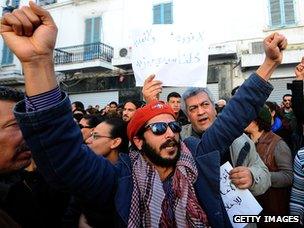
Tunisians overthrew the Ben Ali regime in the first popular revolution of the Arab Spring
2011 January - President Ben Ali goes into exile amid continuing protests.
2011 February - Prime Minister Ghannouchi resigns, responding to demands by demonstrators calling for a clean break with the past.
2011 May - Curfew imposed amid fresh street protests.
2011 October - Parliamentary elections. Ennahda Islamist party wins, but falls short of an outright majority.
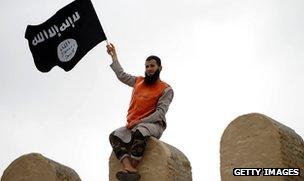
Hard-line Islamists have demanded the introduction of Sharia law in Tunisia
2011 December - Human rights activist Moncef Marzouki elected president by constituent assembly, Ennahda leader Hamadi Jebali sworn in as prime minister.
2012 May - Hundreds of Salafi Islamic extremists clash with security forces and attack a police station in Jendouba in a dispute over Salafi attacks on alcohol sellers.
2012 June - The government imposes an overnight curfew in eight areas following riots by Islamists against an art exhibition. One man died after being shot in the head.
2012 August - Thousands protest in Tunis against moves by Islamist-led government to reduce women's rights. Draft constitution refers to women as "complementary to men", whereas 1956 constitution granted women full equality with men.
2013 February - Prime Minister Jebali resigns after Ennahda party rejects his proposals to form a government of technocrats after the killing of an opposition anti-Islamist leader. Ennahda rejects opposition allegations that it was behind the killing of Chokri Belaid, whose death prompted violent protests.
2013 May - At least one person is killed in clashes between police and Salafi Islamists of the Ansar al-Sharia group in the Tunis suburb of Ettadhamen, where it was holding a meeting. Police also clashed with protesters in the city of Kairouan, where the government had banned an earlier Ansar al-Sharia meeting on security grounds.
2013 July - Assassination of opposition politician Mohamed Brahmi prompts mass demonstrations, a general strike and calls for the government to resign.
2013 December - After months of wrangling, Ennahda and mainly secular opposition agree on appointment of Mehdi Jomaa as head of interim government.
2014 January - Parliament passes the country's first constitution since President Ben Ali was ousted in 2011.
Prime minister-designate Mehdi Jomaa forms cabinet of independents and technocrats, to govern until new elections.
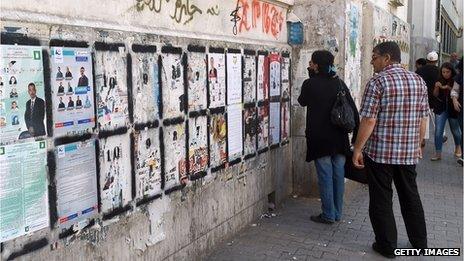
Tunisians look at election posters before the 2014 parliamentary polls
2014 February - The government says the suspected assassin of opposition politician Chokri Belaid has been killed in an anti-terrorist operation.
2014 March - President Marzouki lifts state of emergency imposed in 2011 during ouster of Zine el Abidine Ben Ali.
2014 October - Nidaa Tounes, which unites secularists, trade unionists, liberals and some players from the Ben Ali era, wins largest bloc of seats in parliamentary election, overtaking the Islamist Ennahda.
2014 December - Nidaa Tounes candidate Beji Caid Essebsi becomes president after decisively beating outgoing president Moncef Marzouki in run-off elections.
2015 March - Islamic State extremist group claims responsibility for an attack by three gunmen on the Bardo Museum in Tunis, in which 21 people, mainly foreign tourists, were killed.
2015 June - Islamic State gunman kills 38 people, mainly tourists, on beach at resort of Sousse, in Tunisia's worst terror attack. Government announces closure of extremist mosques.
2015 October - National Dialogue Quartet receives Nobel Peace Prize for helping transition to democracy. Made up of General Labour Union, Confederation of Industry, Trade and Handicrafts, Human Rights League, and Order of Lawyers.
2017 May - Demonstrations against proposed economic reconciliation law that would grant amnesty to businessmen and civil servants accused of corruption under former regime.
2017 April - Morocco and Algeria become embroiled in a diplomatic row over a group of Syrian refugees stranded on their common border.
2017 May-June - Protesters close oil pipeline valves as part of demonstrations demanding job creation and development in poorer inland areas.
2019 October - Retired law professor Kais Saied wins presidential election on an anti-corruption platform.
2020 September - Technocratic government formed to reform public finances.